In fact, according to research, approximately 46% of the Great Pacific Garbage Patch consists of materials relating to the fishing industry. This causes so-called ghost fishing, where abandoned or lost fishing gear 'continues to fish' on its own. It is said that roughly 30% of all fish get entangled in ghost nets, but it can harm seals, turtles, or even whales.
There is no simple solution to a problem of this magnitude, but fortunately there are more and more initiatives to tackle it. Among those initiatives is the E-Redes project, that is taking place in the Northern Littoral Natural Park in Portugal. Under the guise of: “you don't have to clean what you don’t pollute”, it aims to find a more proactive way to avoid ghost fishing. Read on to find out how.
Two-way approach to reduce ghost netting
Vasco Ferreira is Marine Research Consultant for the municipality of Esposende, where the park is located. He has been part of the project since the start: “During beach cleanups and diving sessions, we were able to retrieve a significant amount of gear. But we could create awareness, not solve the problem. The amount of lost fishing gear is so huge: if we want to solve it, we have to change the paradigm. So instead of pulling nets out of the ocean, we need to prevent them from getting there in the first place.”
To do so, the E-Redes project has developed an unprecedented pilot study with sustainable fishing materials. In this study, the local fishing community will be provided with biodegradable gillnets and trammel nets, which cannot damage the environment if it’s lost or discarded.
In addition, the project involves bimonthly beach clean-ups, where the collected debris is quantified and typified. This information is crucial for taking targeted action against marine litter, as consistent and systematic monitoring can provide policy makers with the evidence they need to develop new regulations.
Involving the community
But this information also helps to create awareness and urgency among the local fishing community, says Vasco: “It is their livelihood and it is understandable that they’re not eager to experiment with that. So we need to create awareness of the problem, and prove that even locally, a significant amount of plastics comes from fishing gear.”
The fishing industry will only adopt the sustainable nets if the catch efficiency is at least equal to that of conventional gear. That is why the nets are made locally, using the same method as always. The only difference is that they’re made from a biodegradable monofilament.
The perfect location for a study
With about 16 kilometres in length of beaches, the marine park is perfectly located for this pilot study. The area is protected and there is a small fleet of local fishermen. The investment enables the project to equip more that 50% of the fleet with biodegradable gear. And that means the project has the tools to see if – and to what extent – it makes a difference. That would be impossible on a national scale.
Together with the users, the durability, usability and efficiency will be measured and compared against conventional synthetic gear. Results will be based on performance, but also take into account the economic (costs and local economy), ecological (ecosystems, health and biodiversity) and social (traditions and local practices) factors. And on top of that, a team of engineers from the University of MINHO will conduct an in-depth study of the physical properties of these materials.
“This can be an opportunity for the industry to adapt the machines to produce nets with this filament. But we need some help from governments and the industry. And to get that help we need to prove its worth. But I personally believe that it is cheaper - I really expect it to scale.”
About the project
The E-Redes project is a pilot study promoted by the Municipality of Esposende, in partnership with the municipal company Esposende Ambiente, the University of Minho and the Environmental Defense Association - Rio Neiva, which aims to promote the use of biodegradable nets and, consequently, enable the reduction of synthetic plastic material in the ocean.
Project promoter: Municipality of Esposende
Project cost: €249 237,61
Project Partners:
- EAmb – Esposende Ambiente
- Rio Neiva – Environmental Defense Association
- University of Minho
Find more information on the project website, or on our website. Do you want to learn more about the environmental projects we support in Portugal? Visit our website here.
